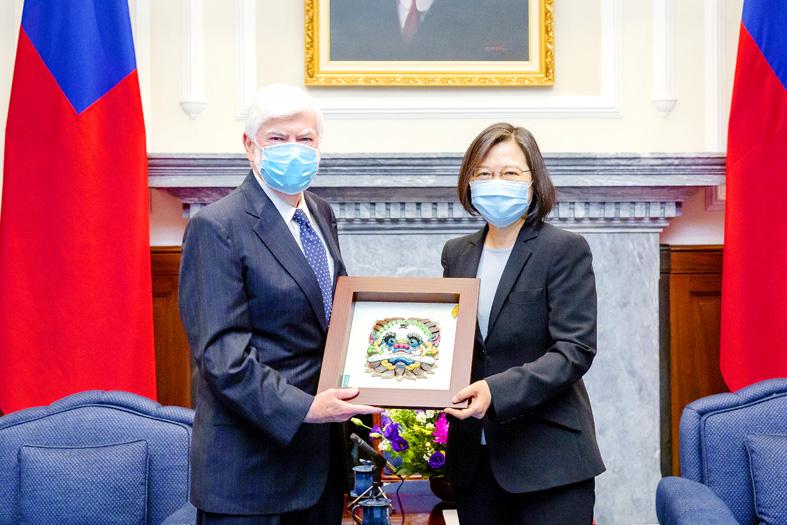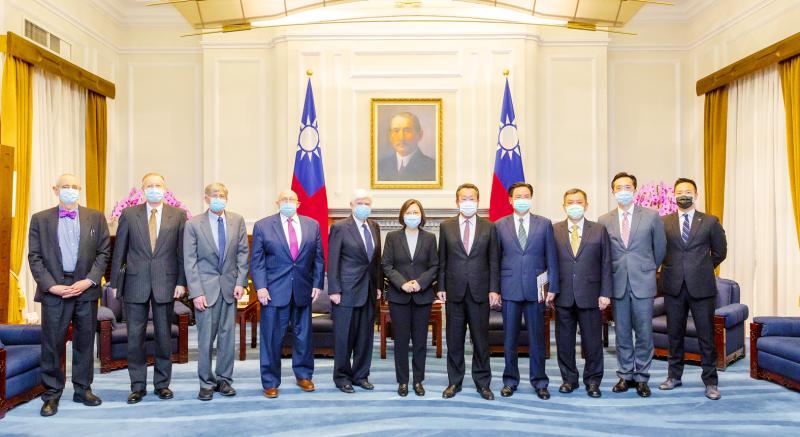Trade negotiations, and safeguarding peace and stability in the Indo-Pacific region were on the agenda yesterday as President Tsai Ing-wen (蔡英文) met with a US delegation at the Presidential Office in Taipei.
Tsai said that she looks forward to resuming trade talks with Washington “as soon as possible,” and is willing to work with like-minded nations in safeguarding regional peace and stability.
Former US senator Chris Dodd, former US deputy secretaries of state Richard Armitage and James Steinberg, and US Department of State Office of Taiwan Coordination Director Dan Biers arrived in Taipei on Wednesday for a three-day visit.

Photo: AP / Presidential Office
The delegation was the first sent by US President Joe Biden since he took office in January.
The visit “highlights how the partnership between Taiwan and the US continues to deepen” under bipartisan support, Tsai said in her opening remarks.
She said that she was optimistic about resuming talks under the bilateral Trade and Investment Framework Agreement, which stalled in October 2016, reportedly because Taiwan was hesitant to import US pork containing ractopamine, a leanness-enhancing feed additive.

Photo: AP / Presidential Office
Taipei on Jan. 1 eased the restrictions, leading to expectations that trade talks would resume.
Tsai thanked the Biden administration for reiterating the importance of peace and stability in the Taiwan Strait amid increased Chinese military activity in the region.
“We are very willing to work with like-minded countries, including the US, to jointly safeguard the peace and stability of the Indo-Pacific, and deter adventurous maneuvers and provocations,” she said.
Green energy, as well as countering misinformation and cognitive warfare, are also areas for long-term cooperation between the two nations, Tsai said.
“Taiwan is committed to carbon reduction and is developing green energy at full speed,” Tsai said, especially as Biden’s administration is “taking proactive actions to cooperate with the world on the issue of climate change.”
Dodd thanked Tsai and offered his condolences for those killed in the derailment of Taroko Express No. 408 on April 2, including “the untimely deaths of two young American teachers, here in Taiwan to enrich their friendship and understanding between our two peoples.”
As someone who was involved in generating initial support for the US’ Taiwan Relations Act, the significance of the legislation “becomes even more evident with each passing year and I can say with confidence that the US partnership with Taiwan is stronger than ever,” he said.
“We share deep economic ties, a mutual commitment to democratic values and a critically important security partnership,” he said, without addressing trade issues directly.
He also expressed confidence that the Biden administration would help Taiwan expand its international space and self-defense capabilities, as well as deepen “already robust” economic ties.
Armitage, who served under former US president George W. Bush, echoed Dodd’s sentiments about the direction of ties with Taiwan under Biden.
While some previous administrations supported Taiwan in part to “vex the Chinese mainland ... [Biden’s] purpose is only to support the continuation of this great democracy,” Armitage said. “That’s the reason that Senator Dodd, Dr Steinberg and I are here.”
Steinberg, who served under former US president Barack Obama, praised Taiwan’s COVID-19 response, calling it a testament to how a democracy can provide strong and effective governance that benefits itself and the world.
Tsai hosted a dinner for the delegation at her residence in Taipei last night ahead of their expected departure today.
New York University law professor Jerome Cohen described the “unofficial” delegation as “perfectly balanced bipartisan” and high-level.
“Dodd is reportedly as close to Biden as friends get. Prominently mentioned earlier as a possible new ambassador to China,” Cohen wrote on Twitter on Wednesday.
“Armitage and Steinberg not only represent the respective political parties, but also are heavy diplomatic hitters who command respect and influence today,” he wrote.
“The mission is a further demonstration of the new diplomacy that is de-emphasizing the formalities of interstate relations and instead focusing on the facts and functions regardless of formal names,” he wrote.
“This is what Taiwan’s distinctive status is stimulating in many protean respects, and I hope the trend will continue,” he wrote. “It can be progressive without being unacceptably provocative.”

A magnitude 5.6 earthquake struck off the coast of Yilan County at 12:37pm today, with clear shaking felt across much of northern Taiwan. There were no immediate reports of damage. The epicenter of the quake was 16.9km east-southeast of Yilan County Hall offshore at a depth of 66.8km, Central Weather Administration (CWA) data showed. The maximum intensity registered at a 4 in Yilan County’s Nanao Township (南澳) on Taiwan’s seven-tier scale. Other parts of Yilan, as well as certain areas of Hualien County, Taipei, New Taipei City, Taoyuan, Hsinchu County, Taichung and Miaoli County, recorded intensities of 3. Residents of Yilan County and Taipei received

Taiwan has secured another breakthrough in fruit exports, with jujubes, dragon fruit and lychees approved for shipment to the EU, the Ministry of Agriculture said yesterday. The Animal and Plant Health Inspection Agency on Thursday received formal notification of the approval from the EU, the ministry said, adding that the decision was expected to expand Taiwanese fruit producers’ access to high-end European markets. Taiwan exported 126 tonnes of lychees last year, valued at US$1.48 million, with Japan accounting for 102 tonnes. Other export destinations included New Zealand, Hong Kong, the US and Australia, ministry data showed. Jujube exports totaled 103 tonnes, valued at

TRUST: The KMT said it respected the US’ timing and considerations, and hoped it would continue to honor its commitments to helping Taiwan bolster its defenses and deterrence US President Donald Trump is delaying a multibillion-dollar arms sale to Taiwan to ensure his visit to Beijing is successful, a New York Times report said. The weapons sales package has stalled in the US Department of State, the report said, citing US officials it did not identify. The White House has told agencies not to push forward ahead of Trump’s meeting with Chinese President Xi Jinping (習近平), it said. The two last month held a phone call to discuss trade and geopolitical flashpoints ahead of the summit. Xi raised the Taiwan issue and urged the US to handle arms sales to

BIG SPENDERS: Foreign investors bought the most Taiwan equities since 2005, signaling confidence that an AI boom would continue to benefit chipmakers Taiwan Semiconductor Manufacturing Co’s (TSMC, 台積電) market capitalization swelled to US$2 trillion for the first time following a 4.25 percent rally in its American depositary receipts (ADR) overnight, putting the world’s biggest contract chipmaker sixth on the list of the world’s biggest companies by market capitalization, just behind Amazon.com Inc. The site CompaniesMarketcap.com ranked TSMC ahead of Saudi Aramco and Meta Platforms Inc. The Taiwanese company’s ADRs on Tuesday surged to US$385.75 on the New York Stock Exchange, as strong demand for artificial intelligence (AI) applications led to chip supply constraints and boost revenue growth to record-breaking levels. Each TSMC ADR represents